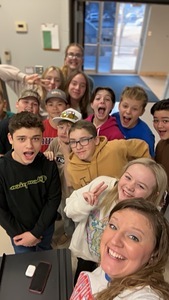39982142
Chapter 4 test
Descripción
Sin etiquetas
Fichas por Maylie Letterman, actualizado hace 7 días
Más
Menos

|
Creado por Maylie Letterman
hace 7 días
|
|
Resumen del Recurso
| Pregunta | Respuesta |
| Define substance farming and what colony it was most common in. | Producing just enough to meet immediate needs nothing to sell -New England |
| What farming practice was common to New York. | Cash crop |
| The most profitable cash crop in South Carolina in Georgia was | Rice |
| How did England view its North American colonies economically? | As an economic resource |
| How did Benjamin Franklin exemplify the enlightenment? | He was a scientist |
| Define militia | A group of civilians trained to fight in emergencies |
| What was the Albany plan of Union? | Colonies against France proposal |
| The seven years war was a war between | France and Britain |
| Which native leader recognize that British settlers threaten the native Americans way of life | Pontiac |
| Define great awakening | Religious revival that’s swept through the colonies |
| Which colony was the hub of shipping in North America? | New England |
| Labor for the southern Rice field was provided by | Enslaved Africans |
| In the southern colonies, the region of small farms was in the | Backcountry |
| Define mercantilism | A theory that says a nations power depends on expanding trade |
| What plan called for one general government for all the American colonies? | Albany plan of Union |
| What British commander was sent to conquer the French and the Ohio valley | Edward Braddock |
| The treaty of Paris marked the end of power in North America for | The French |
| Which man changed Britain’s fortune in the war with France? | William Pitt |
| What was the middle passage? | Voyage for black Africans across the Atlantic oceans to the west Indies freedom to slavery |
| Define substance farming | Farming to produce only what is needed to eat |
| The most inhumane aspect of the triangular trade | Middle passage |
| Where were most of the large southern plantations located | Tidewater |
| Define overseers | People hired by plantation owners to force slaves to work |
| Which group controlled the economic and political life of the southern colonies | Plantation owners |
| What were the navigation acts | Series of English laws regulating shipping from England to the colonies |
| What three types of colonies were in the American colonies | Royal, proprieties, and charters |
| the only people who could vote in the colonies were | White men with land |
| What is the name of the first college? Founded in North America? | Harvard |
| The American who best exemplified the enlightenment way of thinking was | Benjamin Franklin |
| The commander-in-chief of the British forces in America, who wants to drive the French out of America was | Edward braddock |
| What document marked at the end of France as a power in North America | Treaty of Paris |
| After the treaty was signed in 1763 the continent was divided between which two countries | Britain and Spain |
| What document called for a halt to westward expansion? | Proclamation of 1763 |
| The proclamation of 1763 angered wealthy speculators because they | Only land west of the mountains |
| Region of large southern plantations | Tidewater |
| Laws that govern slaves | Slave codes |
| First college in the United States | Harvard |
| British commander in North America | Edward Braddock |
| Oversaw the war effort from London | William Pitt |
| Main cash crop in Georgia | Rice |
| Powerful group of Native Americans | Iroquois confederacy |
| British commander | Jeffery apneas |
| Halted westward expansion | British proclamation of 1763 |
| Ottawa chief | Pontiac |
| Some people in New England used… from streams to run mills for grain or lumber | Water power |
| By the 1770s, New York City and … were the larges cities in the colonies | Philidelphia |
| By the mid 1700s the Iroquois had become a reluctant ally of the | British |
| Braddock did not take Washington’s advice on the style of marching when they set out for fort Duquesne on the site of present day | Pittsburgh |
| In June 1754 representatives from four colonies meeting in Albany New York adopted a plan called the | Albany plan of Union |
¿Quieres crear tus propias Fichas gratiscon GoConqr? Más información.
